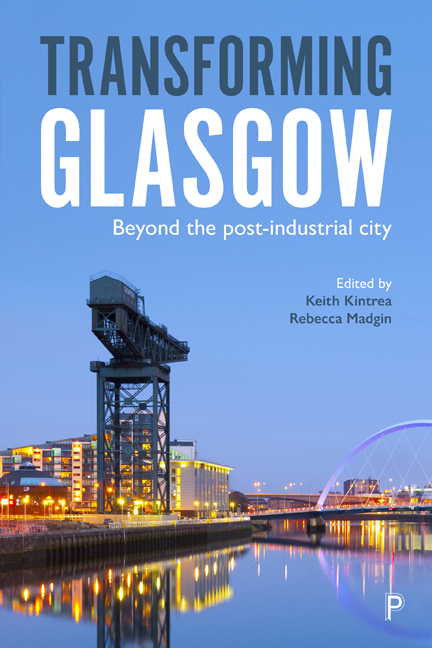Book contents
- Frontmatter
- Contents
- List of Maps, Tables, Figures and Boxes
- Notes on Contributors
- Acknowledgements
- Foreword
- Map
- Introduction: Transforming Post-Industrial Glasgow – Moving Beyond the Epic and the Toxic
- PART I
- PART II
- PART III
- Conclusion: Beyond the Post-Industrial – Narratives of Time and Place
- Index
PART II
Published online by Cambridge University Press: 25 March 2021
- Frontmatter
- Contents
- List of Maps, Tables, Figures and Boxes
- Notes on Contributors
- Acknowledgements
- Foreword
- Map
- Introduction: Transforming Post-Industrial Glasgow – Moving Beyond the Epic and the Toxic
- PART I
- PART II
- PART III
- Conclusion: Beyond the Post-Industrial – Narratives of Time and Place
- Index
Summary
The chapters that make up Part II are primarily focused on the lived experiences within Glasgow. Each chapter takes a facet of this to demonstrate the ways in which the transition to post-industrial and beyond has affected the everyday experiences of residents. Whereas Part I sought to examine how the city has been governed, Part II instead focuses on the consequences of those decisions along with a series of globally determined and locally specific events such as the Global Financial Crisis and the impact of Glasgow's industrial legacy on the life patterns of its residents. Two key questions run through this Part: what does it mean to live in Glasgow now and is there evidence that post-industrial Glasgow has improved the quality of life?
Chapter 5, authored by Mark Livingston and Julie Clark, sets up the main questions of Part II by examining the ‘winners’ and ‘losers’ within the post-industrial transition. In so doing they question some of the normative assumptions surrounding Glasgow's somewhat uncritical espousal of the ‘successful’ regeneration narrative. Chapter 6 further develops this theme but turns instead to focus on the embedded crisis of ill health that has characterised 19th-and 20th-century Glasgow, and continues today. In this chapter David Baruffati, Mhairi Mackenzie, David Walsh and Bruce Whyte implicitly develop the concept of ‘winners’ and ‘losers’ within an analysis of the extent to which Glasgow is moving away from being a ‘sick city in a sick country’. Chapter 7 turns the focus to housing and rebuts Glasgow's entrenched housing narratives to show how the provision of housing has been shaped by the transition to post-industrialism and beyond. Crucially, Douglas Robertson demonstrates how broader, often global, forces have affected the type of housing in the city and its demographic profile. This is a theme taken up by Rebecca Kay and Paulina Trevena in Chapter 8, who consider the ways in which migration into Glasgow, largely as a result of EU enlargement, has affected the labour market, residential composition and demographic profiles of neighbourhoods within the city. Finally, in Chapter 9, Steve Rolfe, Claire Bynner and Annette Hastings provide an in-depth examination of how different community groups have responded to and shaped policies at the neighbourhood level. They demonstrate how the post-industrial period has seen different forms of community activism which yet remains rooted in the strong Glasgow tradition of community-based development.
- Type
- Chapter
- Information
- Transforming GlasgowBeyond the Post-Industrial City, pp. 99 - 100Publisher: Bristol University PressPrint publication year: 2019



